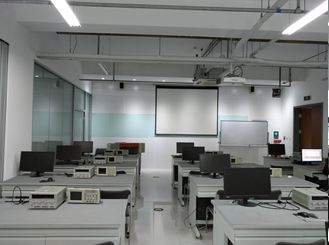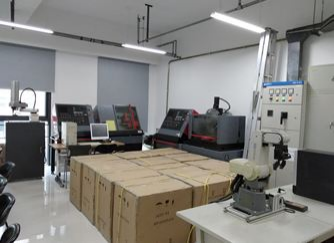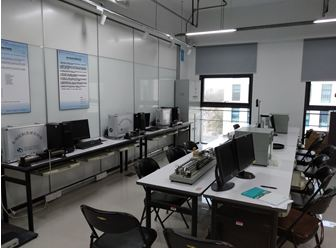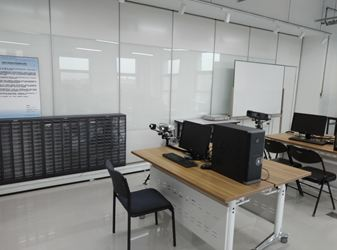I. Main Experiments:
The teaching laboratory is established as one of the teaching and practice bases for courses of the department in electromechanical testing and inspection, and automatic control. It serves as a solid platform for experiment conducting and practical learning to develop students’ skills in bridging theory and practice, applying their acquired knowledge, and engaging in extracurricular scientific research and innovation activities.
The laboratory is designed mainly for undergraduate and graduate students of mechanics-related majors to learn and conduct experiments related to electromechanical control courses. Through experiments in single-chip microcomputers, programmable controllers, and hardware and software design for DSP control systems, students will develop a good mastery of currently advanced control methods in the automatic control field. The series of experiments in fluid media-based process control systems and inverted pendulum control systems will enable them to deepen their understanding of basic control engineering theories. With the guidance of laboratory instructors, they will independently select their own electromechanical control-related topics and complete the entire process, from experiment plan design and hardware development to software programming and final debugging. Additionally, students will gain deeper insights into power electronics technology with experiments involving characteristic testing of power electronic devices and circuit debugging. A variety of hands-on practices will help to increase students’ interest in learning and deepen their grasp of theoretical knowledge, ultimately nurturing their analytical and problem-solving skills.
This laboratory also provides these students with teaching experiments related to testing and inspection courses. Students can acquire a strong grasp of the fundamental principles and performance evaluation methods related to the two key components of testing and inspection systems through sensor testing and signal analysis and processing testing. The exploration of acoustic wave parameter measurement and electromagnetic field spatial characteristics can enhance students’ comprehension of the physics underlying non-destructive testing methods. Additionally, conducting the testing of ultrasonic inspection, eddy current, and acoustic emission can further allow them to master the essential procedures associated with commonly used non-destructive testing methods. This proficiency enables students to confidently perform basic non-destructive testing procedures based on their acquired knowledge.
Some of the experiments provided by the laboratory include the (1) ultrasonic longitudinal wave detection experiment, (2) eddy current testing experiment, (3) acoustic emission experiment, (4) sensor experiment, and (5) signal analysis and processing circuit application experiment.
II. Major Equipment:
The laboratory is equipped with 1 digital ultrasonic flaw detector, 4 analog ultrasonic flaw detectors, 5 ultrasonic test blocks of various types; 4 multi-frequency eddy current flaw detectors, 5 sets of analog eddy current flaw detection devices, and 8 sets of eddy current probes of various types; 4 sets of acoustic emission test devices and 16 acoustic emission receiving probes; 16 digital oscilloscopes and 16 signal generators; and 5 sets of multi-purpose sensor test devices. Additionally, there are 5 sets of devices for signal analysis and processing testing. The laboratory also has more than 20 computers, 1 set of the FESTO-PCS process control experimental system, over 20 sets of the SIEMENS S7-200 and OMRON C40H PLC experimental systems, more than 20 sets of the MCS80C196 single-chip microcomputer teaching and experimental system, over 30 sets of the ELAN EM78 series single-chip microcomputer teaching and experimental system, and 10 sets of the DSP-based inverted pendulum teaching and experimental devices. There are also over 20 sets of the TMS320LF240X DSP teaching and experimental system, more than 20 sets of ADuC812 single-chip microcomputer teaching and experimental system, 3 sets of the QT-14 transistor graphic instruments, 3 sets of the power electronic circuit experimental platforms, and over 30 sets of electrical and electronic practice tools, including oscilloscopes and multimeters.

Testing technology laboratory

Numerical control machining center

Automatic control teaching experiment

Non-destructive inspection laboratory
III. Main Courses Supported:
The laboratory annually provides support through multimedia teaching and relevant experiments for courses such as Fundamentals of Control Engineering (30120163), Microcomputer Control of Mechanical Systems (30120103), Power Electronics Technology and Applications (40120312), Fundamentals and Applications of Robotics Engineering (00120062), Principles of Automatic Control of Electromechanical Systems (70120023), Computer Control of Mechanical Systems (60120013), and other electromechanical control-related courses (totaling more than 180 credit hours, equivalent to about 20,000 student hours).
In addition, the laboratory offers practice courses like Control Engineering Fundamentals Experiment Series (20120091) and Electromechanical Control Systems Practice (20120082).
Every year, the laboratory can host about 20 undergraduates in the SRT (Student Research Training) and Project programs to participate in practical scientific research and exploration.
IV. Location and Directors:
Location: Room A311, Lee Shau Kee Science and Technology Building (Reservation required)
Laboratory Director: Du Dong. Deputy Laboratory Director: Wang Li.